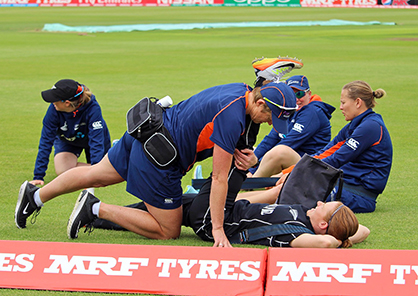Touch, set, bind ...
As the former captain of New Zealand's Black Ferns, Helen Littleworth might add 'listen' to this familiar Kiwi rugby mantra.
She believes that high-performance athletes know how hard they can push themselves. Sports physios can help lift individual and team performance and put more wins on the scorecard - but first they must listen.
At home in Dunedin
Helen grew up in Masterton and left Wairarapa College a little earlier than some, so that she could travel and compete with New Zealand's national hockey team - now the Black Sticks. She later headed south to Christchurch, shifting her focus to top level women's rugby.
Having needed the care of sports physiotherapists herself, Helen soon realised the vital role the profession plays in competitive sport. She began her physiotherapy studies at Otago while in her early 20's.
Helen believes that the scale of the university city of Dunedin fosters collaboration.
Dunedin - the largest city in Otago - offers a supportive student environment, and encourages a strong sense of community and Helen chose to make it her family's home.
Listening builds trust
Physiotherapists support their charges, helping to lift individual performance and lower injury rates.
Such backup works best when the physiotherapist is a skilful and engaged listener.
The patient says they need a 'quick fix' but the therapist suggests a more expansive and multi-modal approach. What may present as a straightforward injury can be the result of a complex series of factors, and the individual's experience of pain illustrates this complexity.
 All pain is subjective by nature. The patient feels pain and wants it to stop and this pressing need may stand in the way of better longer-term strategies which offer a superior chance of success and faster return to the field of play. Good diagnostics need clear communication between patient and therapist, and such specificity helps to build essential trust.
All pain is subjective by nature. The patient feels pain and wants it to stop and this pressing need may stand in the way of better longer-term strategies which offer a superior chance of success and faster return to the field of play. Good diagnostics need clear communication between patient and therapist, and such specificity helps to build essential trust.
While new technical tools make it easier to target interventions they can only provide partial answers.
Strong therapeutic relationships
Helen says that an over-reliance on technology may lead to treatment regimens which are too complex and, as a result, much less helpful.
Effective rehabilitation relies upon listening, looking and assessing, and while technology can help immensely, it cannot replace hands-on physiotherapy which is as much intuitive as it is scientific.
When positive shared expectations join with strong therapeutic relationships, the resulting 'therapeutic alliance' empowers both clinician and patient.
You can read more about sports physiotherapy study at Otago here
Facts and figures
Helen Littleworth gained a Diploma in Physiotherapy, a Post Graduate Diploma in Manipulative Physiotherapy and a Masters in Manipulative Physiotherapy; all from Otago.
- Physiotherapist to New Zealand White Ferns, New Zealand Women's Cricket team.
- Preferred physiotherapy provider for High Performance Sports New Zealand.
- Physiotherapist to New Zealand para-athletics team at the Olympic Games Rio de Janiero, 2016.
- Former Lead physiotherapist for Athletics New Zealand 2006 - 2012
- Team physiotherapist at the Olympic Games Beijing in 2008 and London Olympic Games in 2012.
- Physiotherapist to the Black ferns 1998- 2002.
- Named University of Otago's Sportsperson of the Year in October 1995.
- Black Ferns New Zealand rugby team member between 1990 and 1996, and captain on 8 occasions.
- Member of New Zealand Women's Hockey Team from 1986-1988.
Publications
Lawrence, R. (2005). Branding terroir in the ′New World′: Modes of representation in the wine industry. In P. Sorrell, C. Ozcan, E. Kocabiyik & Z. T. Ultav (Eds.), Proceedings of the IST Product and Service Design Symposium and Exhibition on Agricultural Industries. Izmir, Turkey: Izmir University of Economics. [Full Paper] Conference Contribution - Published proceedings: Full paper